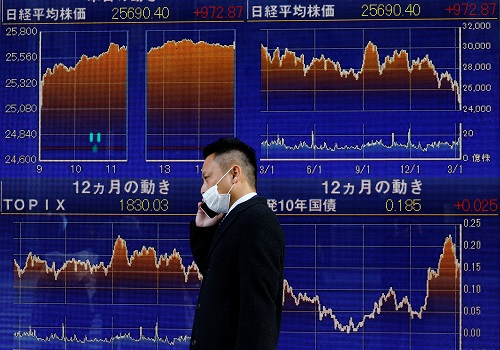Asian shares slip on fears that Fed will have to stay hawkish

Follow us Now on Telegram ! Get daily 10 - 12 important updates on Business, Finance and Investment. Join our Telegram Channel
Asian shares fell on Friday and were set for a second week of losses, while the dollar firmed as strong U.S. data revived fears the Federal Reserve will have to retain its hawkish stance to tame inflation.
MSCI's broadest index of Asia-Pacific shares outside Japan dropped 1%, snapping a two-day winning streak. Australia's S&P/ASX 200 index and Japan's Nikkei also lost 1%.
U.S. weekly jobless claims data pointed to a still tight labour market, while the U.S. economy rebounded faster than previously estimated in the third quarter.
The data "flamed fears that further monetary policy tightening in 2023 will be necessary to cool inflation," said Tony Sycamore, a market analyst at IG.
Specifically, investors are fretting that the Fed funds target rate could rise higher and stay there longer than previously expected, raising the possibility of an economic contraction.
European stock futures indicated that stocks were set to rise, with the Eurostoxx 50 futures climbing 0.44%, German DAX futures advancing 0.48% and FTSE futures up 0.20%.
Market attention will now shift to U.S. personal consumption expenditures (PCE) data due later on Friday that will provide further clues on whether inflation is continuing to moderate. Economists polled by Reuters expect core PCE price index to rise 0.2% for November, while predicting a 4.7% rise for the twelve months through November.
"Friday could be an important day for markets," said Tom Lee, head of research at Fundstrat Global Advisors, adding that downside surprises to PCE inflation could result in a less hawkish path forward for the Fed.
The U.S. central bank raised interest rates by 50 basis point this month after four consecutive 75 basis-point hikes this year, but Chair Jerome Powell has said the Fed will deliver more hikes in 2023 even as the economy slips towards a recession.
China stocks were little changed, while Hong Kong stocks fell as China grapples with soaring COVID-19 infections, in the wake of Beijing dismantling its strict zero-COVID policy to contain the virus.
In the currency market, the Japanese yen weakened 0.26% versus the greenback to 132.70 per dollar. It, however, remains on track for its third largest weekly gain this year of more than 3%, after the central bank stunned markets on Tuesday by tweaking its policy on government bonds.
"Investors should prepare themselves for rapid yen appreciation against the dollar once the market sees monetary policy in Japan and the U.S. flipping direction," Mizuho analysts said.
The spike in the yen has come after Bank of Japan's surprise tweak on Tuesday to allow the 10-year bond yield to move 50 basis points either side of its 0% target, wider than the previous 25 basis point band.
Data on Friday showed Japan's core consumer inflation in November hit a fresh 40-year high of 3.7% as companies continued to pass on rising costs to households, casting doubts on the BOJ's view that recent cost-push inflation will prove temporary.
The latest inflation numbers are likely to keep alive market expectations the central bank will further roll back its massive stimulus next year.
The dollar index, which measures the greenback against six other currencies, rose 0.01% to 104.39. The euro was up 0.09% to $1.0603. Sterling was last trading at $1.2032, down 0.09% on the day.
Meanwhile, oil prices rose on expectations of lower Russian crude exports from the Baltic region in December. [O/R]
U.S. crude rose 1.02% to $78.28 per barrel and Brent was at $81.68, up 0.86% on the day.












 320-x-100_uti_gold.jpg" alt="Advertisement">
320-x-100_uti_gold.jpg" alt="Advertisement">











